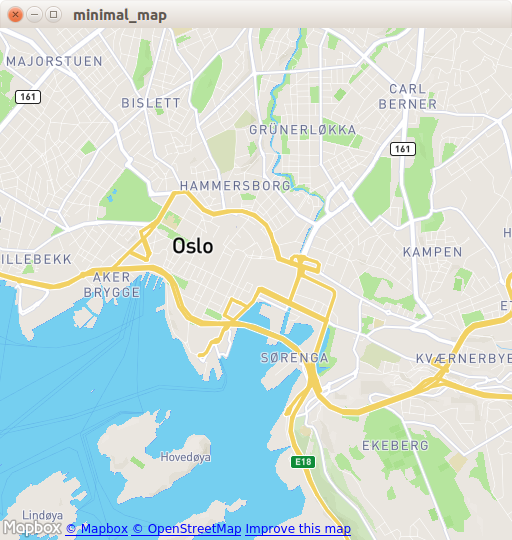Minimal Map (QML) | Qt Location (original) (raw)
The minimum code to display a map using Qt Quick.

Minimal Map demonstrates how to use the Map item to render a map. It shows the minimum amount of code needed to display the map, and can be used as a basis for further experimentation.
Running the Example
To run the example from Qt Creator, open the Welcome mode and select the example from Examples. For more information, see Qt Creator: Tutorial: Build and run.
C++ Code
In main.cpp we use only the QGuiApplication and QQmlApplicationEngine classes.
#include #include
In the main function, we first instantiate a QGuiApplication object. Then we create a QQmlApplicationEngine and tell it to load main.qml from the Qt Resource System.
Finally, QGuiApplication::exec() launches the main event loop.
QML Code
In main.qml, we import the QtLocation QML module and its depending QtPositioning QML module. Next, we create the top level window, set a sensible default size, and make it visible. The window will be filled by a Map item showing the map.
import QtQuick import QtLocation import QtPositioning
Window { width: Qt.platform.os == "android" ? Screen.width : 512 height: Qt.platform.os == "android" ? Screen.height : 512 visible: true title: map.center + " zoom " + map.zoomLevel.toFixed(3) + " min " + map.minimumZoomLevel + " max " + map.maximumZoomLevel
[Plugin](qml-qtlocation-plugin.html) {
id: mapPlugin
name: "osm"
}
[Map](qml-qtlocation-map.html) {
id: map
anchors.fill: parent
plugin: mapPlugin
center: QtPositioning.coordinate(59.91, 10.75) // Oslo
zoomLevel: 14
property geoCoordinate startCentroid
[PinchHandler](qml-qtquick-pinchhandler.html) {
id: pinch
target: null
onActiveChanged: if (active) {
map.startCentroid = map.toCoordinate(pinch.centroid.position, false)
}
onScaleChanged: (delta) => {
map.zoomLevel += Math.log2(delta)
map.alignCoordinateToPoint(map.startCentroid, pinch.centroid.position)
}
onRotationChanged: (delta) => {
map.bearing -= delta
map.alignCoordinateToPoint(map.startCentroid, pinch.centroid.position)
}
grabPermissions: PointerHandler.TakeOverForbidden
}
[WheelHandler](qml-qtquick-wheelhandler.html) {
id: wheel
// workaround for QTBUG-87646 / QTBUG-112394 / QTBUG-112432:
// Magic Mouse pretends to be a trackpad but doesn't work with PinchHandler
// and we don't yet distinguish mice and trackpads on Wayland either
acceptedDevices: Qt.platform.pluginName === "cocoa" || Qt.platform.pluginName === "wayland"
? PointerDevice.Mouse | PointerDevice.TouchPad
: PointerDevice.Mouse
rotationScale: 1/120
property: "zoomLevel"
}
[DragHandler](qml-qtquick-draghandler.html) {
id: drag
target: null
onTranslationChanged: (delta) => map.pan(-delta.x, -delta.y)
}
[Shortcut](qml-qtquick-shortcut.html) {
enabled: map.zoomLevel < map.maximumZoomLevel
sequence: StandardKey.ZoomIn
onActivated: map.zoomLevel = Math.round(map.zoomLevel + 1)
}
[Shortcut](qml-qtquick-shortcut.html) {
enabled: map.zoomLevel > map.minimumZoomLevel
sequence: StandardKey.ZoomOut
onActivated: map.zoomLevel = Math.round(map.zoomLevel - 1)
}
}}
The Plugin item is necessary to define the map provider we are going to use. The example can work with any of the available geo services plugins. However, some plugins may require additional plugin parameters in order to function correctly and we can use PluginParameter to specify them. In this example, we use the osm plugin, which is a Qt Location Open Street Map Plugin and does not require any parameters.
In the Map item, we refer to the plugin we use and we set the center and the zoomLevel of the map.
Requirements
The example requires a working internet connection to download OpenStreetMap map tiles. An optional system proxy should be picked up automatically.
© 2025 The Qt Company Ltd. Documentation contributions included herein are the copyrights of their respective owners. The documentation provided herein is licensed under the terms of the GNU Free Documentation License version 1.3 as published by the Free Software Foundation. Qt and respective logos are trademarks of The Qt Company Ltd. in Finland and/or other countries worldwide. All other trademarks are property of their respective owners.